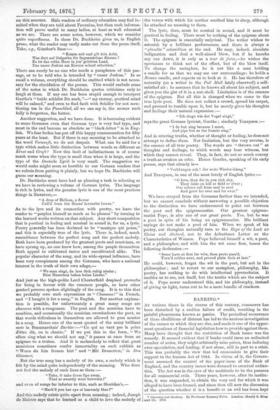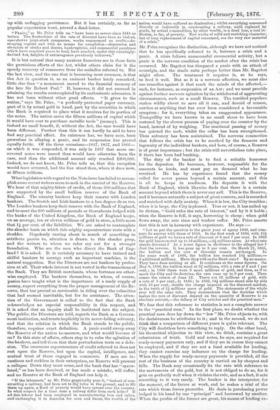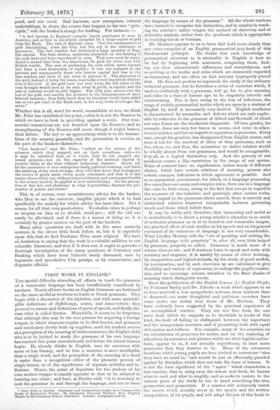BANKING.* AT various times in the course of this century,
commerce has been disturbed by a sudden failure of credit, resulting in the painful phenomena known as panics. The periodical recurrence of these ebullitions of distrust has led to the anxious investigation of the causes to which they are due, and made it one of the upper- most questions of financial legislation how to provide against them. Many have thought that the restriction of Bank issuer was the remedy. It seemed evident that if banks could issue an unlimited number of notes, they might arbitrarily raise prices, thus inducing over-speculation, and leading, if not alone, still in part to a crisis. This was probably the view that led economists to give their support to the famous Act of 1844. In virtue of it, the Govern- ment assumed the control of the paper-issue of the Bank of England, and the country issues were doomed to eventual extinc- tion. The Act was in the eyes of the multitude to be the panacea for all commercial evils. Three years, however, after its institu- tion, it was suspended, to obtain the very end for which it was alleged to have been framed, and since then till now the discussion of the question whether it is a benefit or an evil has been kept
• Currency and Banking. By Professor Bonaniy Price. London; Henry S. King and Co. 1878.
up with unflagging persistence. But it has certainly, as far as popular expectation went, proved a dead-letter.
" Panics," as Mr. Price tells us, "have been as severe since 1844 as before. The fluctuations of the rate of discount have been as violent, speculative joint-stock companies, works commenced on credit—de- stroying capital and with no means for completion—depression and elevation of stocks and shares, bankruptcies, and commercial paralyses which have required years to heal, have reached, under this cunningly- devised Act, heights of extravagance previously unknown."
It is but natural that many anxious financiers see in these facts the pernicious effects of the Act, whilst others claim for it the speedy recovery of commerce from the maladies referred to. But the last view, and the one that is becoming most common, is that the Act in question is, as an eminent banker lately remarked, little else than "a monument sacred to the financial memory of the late Sir Robert Peel." If, however, it did not succeed in attaining the results contemplated by its enthusiastic advocates, it Las not been without other good effects. " lt gives to the nation," says Mr. Price, "a perfectly protected paper currency, part of it by actual gold in hand, part by the securities in which the Bank is required to place what it receives for its portion of the notes. The nation saves the fifteen millions of capital which it would have cost to purchase metallic tools" (money). This is indeed no small benefit, if, without the Act, the case would have been different. Further than this it can hardly be said to have had any practical effect. Its existence has, we have seen, been powerless in allaying a panic, and its suspension has proved equally futile. Of the three occasions-1847, 1857. and 1866— on which it was suspended, it was only in 1857 that more un- covered notes were issued than would have otherwise been the ease, and then the additional amount only reached £800,000. Indeed, we do not know, Mr. Price tells us, that this exception would have occurred, had the line stood then, where it does now, at fifteen millions.
What legislation with regard to the Note issue has failed to accom- plish some recent writers seem to seek in the control of the Reserve. We hear of that mighty fabric of credit, of those 600 millions that are supported by the small bullion reserve of the Bank of England. The country bankers keep their reserve with London bankers. The Scotch and Irish bankers to a less degree do so too. The London bankers keep their reserve with the Bank of England, and to meet the 600 millions of pounds or thereabouts lodged with the banks of the United Kingdom, the Bank of England keeps, on an average, ten or eleven millions of gold in store, a little more that 1 jc per cent, of the liabilities. We are asked to contemplate the slender basis on which this mighty superstructure rests with a shudder. Hopelessly casting about in search of something to attribute panics to, attention is drawn to this slender prop, and the writers to whom we refer cry out for a stronger foundation. Who are the men who direct the Bank of Eng- land? it is asked. It is certainly necessary to have trained and skilful bankers to manage such an important machine, is the natural suggestion. But the Directors are not bankers by profes- sion at all. Their whole interest is not vested in the transactions of the Bank. They are British merchants, whose fortunes are other- wise employed. The bankers themselves, to whom, of course, panics have taught what is the importance of a ready supply of money, expect everything from the proper management of the Re- serve, that has proved so serviceable in tiding over the calamities that had seemed inevitable, but for its assistance. The atten- tion of the Government is called to the fact that the Bank acknowledges no especial responsibility in this respect, and it is asked that an inquiry shall be instituted into the subject. The public, the Directors are told, regards the Bank as a Govern- ment institution, and trusts implicitly in its never-failing solvency, and that the relation in which the Bank stands to the public, therefore, requires exact definition. A panic could sweep away the Reserve of the nation to-morrow, and what would become of am ? In this state of affairs, others step in to calm the agitation of the bankers, and tell them that their perturbation rests on a delu- sion. The enormous superstructure of credit referred to does not rest upon the Reserve, but upon the capital, intelligence, and mutual trust of those engaged in commerce. If men are in- cautious and reckless in their enterprises, no Reserve will prevent a collapse. Down they must come, and the bank that has "specu- lated," or has been deceived, or has made a mistake, will suffer, and no Reserve at the Bank of England can help it.
"If the labourers," as Mr. Price graphically puts it, "instead of-con- structing a railway, had been set to dig holes in the ground, and to fill them up again, a flood of poverty would have spread over the country. In what respect for a time does a railway differ from such boles? If all this labour had been employed in manufacturing iron and calico, and exchanging it in America for corn and bacon, the wealth of the
nation would have suffered no diminution ; whilst everything consumed directly or indirectly in constructing a railway, until replaced by goods, by actual commodities, by other wealth, is a dead loss, a real in- fliction, so far, of poverty. New works of solid and enriching character, but of long replacement of capital consumed, are the very raw material of a crisis."
Mr. Price recognises the distinction, although we have not noticed that he has specifically referred to it, between a crisis and a panic. A crisis follows unsuccessful commercial activity, but a panic is the nervous condition of the market after the crisis has
occurred. Mr. Bagehot has 6mpared a panic with an attack of neuralgia, and the simile suits perhaps better than Mr. Bagehot might allow. The treatment it requires is, as he says, to feed it well. But as it is a nervous affection, we must also use remedies against it that reach the minds of the affected,—
such, for instance, as suspension of an Act; and we must provide against further nervous agitation by the withdrawal of aggravating circumstances, such as a small Reserve. The terrified populace rushee wildly about to save all it can, and devoid of reason, catches at anything that has ever been considered a favourable symptom ; for it, everything takes an exaggerated appearance. Tranquillity we have known in no small share to have been restored by the slower process of paying over the counter by the hand, instead of by weighing. The continual passing of money has quieted the mob, whilst the cellar has been strengthened. Thus solvency has been maintained. The nervous commotion that follows the crisis has to be soothed by the firmness and ingenuity of the individual bankers, and here, of course, a Reserve is of great importance ; but the crisis will nevertheless take place, if there has been bad banking.
The duty of the banker is to find a suitable borrower for the depositor. He becomes, however, responsible for the amounts he lends, and must pay on demand what he has received. He has by experience found that the money called for never passes beyond a certain amount, and this is all he keeps in readiness. He deposits it with the Bank of England, which likewise finds that there is a certain amount beyond which there is never any call. This is the Reserve, and it becomes naturally a subject of great concern, and is recorded and watched with daily anxiety. When it is low, the City trembles; when it is large, the City is pleased. True or not, it has nailed up its dictum, " Gold rules the rate of interest," and by it it holds ; when the Reserve is full, it says, borrowing is cheap ; when gold flows away, the rate rises and traders suffer. Mr. Price asserts that this is not in harmony with experience. He says :—
" Let us put the question to the great year of agony 1866, and com- pare its answer with those of 1856. In the Stet week of 1856, with 10k millions of gold we have a rate of discount of 6 and 7 per cent. In 1866 the gold has mounted up to 13 millions,-2f millions more. At what rate stands discount? At a lower figure in obedience to the alleged law ? Just the reverse. It has gone up to 8 per cent. On March 21, 1856, the bullion and the rate of discount remain unchanged. In the same week of 1866, the bullion has reached 141 millions,- 4 additional millions. Have they told on the Bank-rate? By no means. They have done nothing at all. Itcontinues at the same figures. On May 9, 1856, the bullion stood at n millions, with a rate of 6 and 7 per cent.; in 1866 there were 3 more millions of gold, and then, as if to mock the City and its doctrine, the rate runs up to 9 per cent. Then comes the return of June 12. There are 12 millions of gold, with a rate of S per cent., in 1856; in 1866, 144 millions stand side by aide with 10 per cent., double the charge imposed on the discount market, in the teeth of 2k millions more of gold. The statements of the whole year toll the same tale. They demonstrate that the doctrine which makes the rate of discount depend on the quantity of Reserve is an absolute untruth,—the fallacy of City articles and the practical man."
We fear that this reference to statistics is not a complete answer to the "practical man." In the first place, we doubt whether the practical man does lay down the " law " Mr. Price objects to, with the decisiveness be attributes to it; and in the second, we do not think that a comparison of different years is quite relevant. The City will doubtless have something to reply. On the other hand, his theoretical objection to this view, we think, contains a great substratum of truth. Gold and notes, he says, are required for ready-money payments only, and if they are in excess they cannot be employed, and if they are not a fund available for lending, they cannot exercise any influence on the charge for lending. When the supply for ready-money payments is provided, all the rest of the business of the country is carried on by cheques and bills. The Bank may occasionally fix the rate with reference to the movements of the gold, but it is not obliged to do so, for it gets on perfectly well when it violates the rule, and as a fact, it acts according to it very rarely. The banker is the interpreter, for the moment, of the forces at work, and he makes a trial of the rate which those forces prescribe. He deals in purchasing power lodged in his hand by one "principal" and borrowed by another. When the profits of the former are great, his means of lending ex- pand, and vice versa. Bad harvests, new enterprises, colonial undertakings, in short, the events that happen to his two "prin- cipals," rule the banker's charge for lending. For instance :—
" A bad harvest in England compels heavy purchases of corn in America, and at first is invariably attended by a large export of gold from the Bank. The rate of discount rises. See the consequences of gold diminishing,' cries the City, but the cry is the utterance of ignorance. The bad weather has destroyed a large quantity of Eng- lish capital. The food, clothes, materials, expended on the farming of the year have not been reproduced in corn. That corn must be repro- duced a second time from the Americans, be paid for twice over with British wealth. The cost of producing the corn which never ripened bas been a vast destruction of capital ; it was not replaced at the harvest, and consequently those who borrow capital find less in the loan market, and have to pay more to procure it. The departure of the gold, instead of being the cause, is actually a very important diminu- tion of the evil. If the gold were not sent away, the fall value of the corn brought would have to be sent away in goods, in capital, and the rate of interest would be still higher. The City may mourn over the loss of the gold, and ascribe the pressure to the disappearance of their beloved treasure ; they little know that its retention would have added one or two per cent. to the Bank-rate, in the very teeth of a larger Re- serve."
Whether this is all, word for word, unassailable or not, we think Mr. Price has established his point,—that it is not the Reserve to which we have to look in providing against a crisis. Our com- mercial transactions are not founded upon the Reserve, and no strengthening of the Reserve will avert, though it might hasten, their failure. The key to an approaching crisis is in the transac- tions of the country generally, and the prevention is caution on the part of the bankers themselves.
"Let bankers," says Mr. Price, "reflect on the nature of the schemes which they support, not on their soundness only—for it may be admitted that, as a whole, they do not support un- sound projects—but on the capacity of the national capital to execute them at the time without temporary disaster. Above all, let the promoters of new enterprises study political economy, and learn the meaning of the word savings; they will then know that savings are the excess of goods made above goods consumed, and that it is this excess alone which can, without impoverishment and consequent trouble to the money market, be applied to new undertakings. On the percep- tion of this law, and obedience to what it prescribes, depends the pre- vention of panics and crises."
This is, of course, very unsatisfactory advice for the banker, who likes to see the concrete, tangible physic which is to heal specifically the malady for which advice has been taken. But it seems, for all that, very good advice. To abolish crises is perhaps as utopian an idea as to abolish small-pox ; still the evil can surely be alleviated, and if there is a means of doing so, it is certainly by greater caution on the part of the bankers.
Many other questions are dealt with in the same masterly manner, in the clever little book before us, but it is especially upon this that we find Professor Price most original. We have no hesitation in saying that the work is a valuable addition to our scientific literature, and that if it does not, it ought to provoke a thorough investigation of the many questions of Currency and Banking which have been hitherto rarely discussed, save by ingenious and speculative City gossips, or by conservative and dogmatic officials.




































 Previous page
Previous page